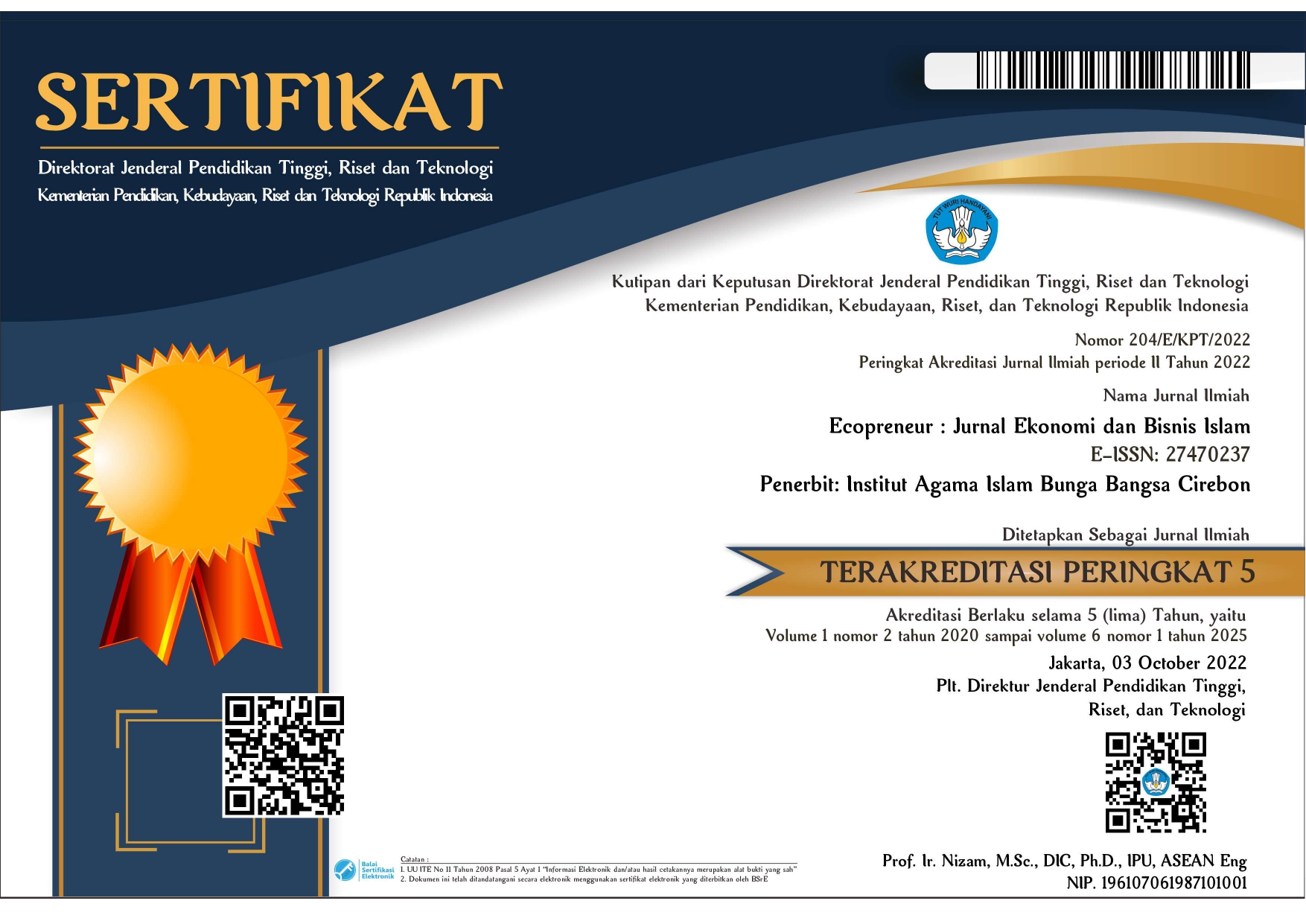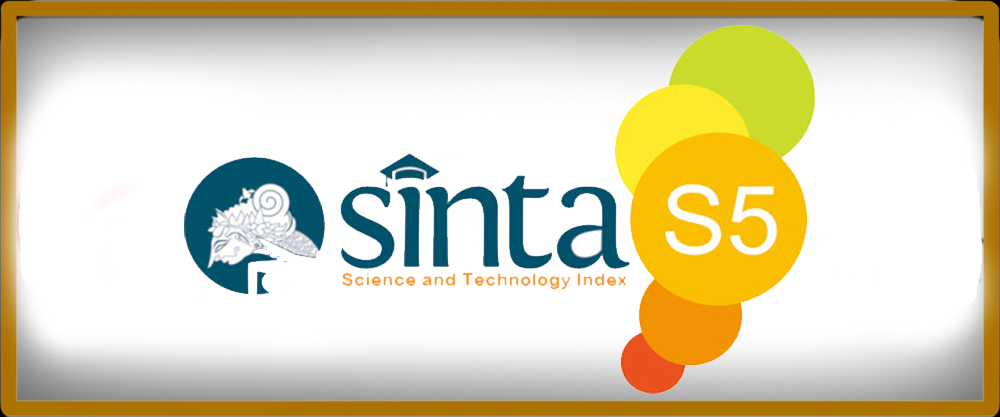Pengaruh Utaut2 Terhadap Loyalitas Muzakki Dalam Membayar Zakat Melalui Kepuasan Sebagai Variabel Mediasi
Abstract
This study aims to examine the influence of Utaut2 which is the ease of carrying out activities with the help of technology will affect the loyalty of muzakki. mediated by the variable of satisfaction loyal Muzakki will routinely give zakat, so that the funds collected will be more continuous and increase. This will certainly lead to the realization of a strong community because there is a cross-subsidy between the owner of the fund (muzakki) and the brothers and sisters who need a helping hand. In solving the above hypothesis, we use quantitative research methods. The experimental design was carried out in this study involving 68 students in the management study program of the Faculty of Economics and Business, Selamat Sri Kendal University who already have a fixed income. The students involved in this research have actively used e-banking facilities and are active in distributing zakat. They will be given a questionnaire questionnaire that they must fill out according to the actual situation. The questionnaire contains questions to see student perceptions related to the variables studied, namely Utaut2, Muzakki Satisfaction and Muzakki Loyalty with assessments carried out on a Likert scale. Referring to the results of the study stated that Utaut2 had a positive and significant effect on Muzakki loyalty, the Utaut2 variable had a positive and significant effect on Muzakki Satisfaction, the Muzakki Satisfaction variable had a positive and significant effect on the Muzakki Loyalty variable and the Muzakki Satisfaction variable proved to be able to mediate the relationship between Utaut2 and Muzakki Loyalty positively and significantly
Keywords: Utaut2;Muzakki Satisfaction; Muzakki Loyalty
Abstrak
Penelitian ini bertujuan untuk menguji pengaruh Utaut2 yang merupakan kemudahan dalam menjalankan aktifikas dengan bantuan teknologi akan mempengaruhi loyalitas muzakki. dengan dimediasi variabel kepuasan Muzakki yang loyal akan rutin berzakat, sehingga dana yang dihimpun akan lebih continue dan meningkat. Hal ini tentunya akan menjadikan terwujudnya umat yang kuat karena ada subsidi silang antara pemilik dana (muzakki) dan saudara seiman yang membutuhkan uluran dana. Dalam memecahkan hipotesis diatas, kami menggunakan metode penelitian kuantitatif. Desain eksperimental dilakukan pada penelitian ini yang melibatkan 68 mahasiswa pada program studi manajemen Fakultas Ekonomika dan Bisnis Universitas Selamat Sri Kendal yang sudah berpenghasilan tetap. Para mahasiswa yang terlibat dalam penelitian ini telah aktif menggunakan fasilitas e-banking dan aktif dalam menyalurkan zakat. Mereka akan diberikan angket kuesioner yang harus mereka isi sesuai dengan keadaan yang sebenarnya. Kuesioner tersebut berisi pertanyaan untuk melihat persepsi mahasiswa berkaitan dengan variabel yang diteliti yaitu Utaut2, Kepuasan Muzakki dan Loyalitas Muzakki dengan penilaian dilakukan dengan skala likert. Merujuk hasil penelitian menyatakan bahwa Utaut2 berpengaruh positif dan signifikan terhadap loyalitas muzakki, variabel Utaut2 berpengaruh positif dan signifikan terhadap Kepuasan Muzakki, variabel Kepuasan Muzakki berpengaruh positif dan signifikan terhadap variabel Loyalitas Muzakki dan variabel Kepuasan Muzakki terbukti mampu memediasi hubungan Utaut2 dengan Loyalitas Muzakki secara positif dan signifikan.
Kata Kunci : Utaut; Kepuasan Muzakki; Loyalitas Muzakki
Downloads
References
Khozin, A. A., Pratama, F. A., Ridwan, M., Amin, N. M. F., & Lesmana, T. (2022). Inflation and the Stability of Islamic Finance. ICOBBA_2021, 404-409.
Marleni, E., Mustoip, S., & Sulkhah, S. (2024). Implementation of the Literacy Movement in Shaping Student Character in Elementary School. EduBase: Journal of Basic Education, 5(2), 120-130.
Munajim, A., Pratama, F. A., Ridwan, M., & Rohimah, I. (2022). The Operations of the Bank Wakaf Micro Indonesia with the Scheme for the Economic Empowerment of the People. ICOBBA_2021, 1-6.
Nasir, A., Busthomi, A. O., & Rismaya, E. (2022). Shariah Tourism Based on Local Wisdom: Religious, Income, Motivation, Demand and Value of Willingness to Pay (WTP). International Journal Of Social Science And Human Research, 5(08), 3811-3816.
Pratama, F. A., Ridwan, M., Yulianti, N., Ratnawati, R., Maulana, A., & Masitoh, S. I. (2022). Implementasi Persamaan Fungsi Non Linier Dalam Matematika Bisnis Pada Kehidupan Sehari-Hari. Change Think Journal, 1(03), 289-299.
Pratama, G. (2022). Comparative Study of The Empowerment of Zakat BAZNAS Indonesia and PPZ Malaysia. ICOBBA_2021, 212-216.
Putri, Y. D. S., Mustoip, S., Nisa, D. H., & Ramadhani, N. U. (2024). Implementation of Audiolingual Methods in Understanding Arabic Color Concepts in Class I SDIT Alif Mardiyah. JPS: Journal of Primary School, 1(2), 1-6.
Ridwan, M., Motik, D. P., & Nurwahid, H. I. (2022). Afzalur Rahman's Thinking Concept: Relevance with Worker Ethics According to Global Standards. ICOBBA_2021, 322-329.
Selasi, D., Agustiani, L. R., & Vidiati, C. (2022). Upaya Mengubah Pendapatan Usaha Mikro Kecil Menengah (UMKM) Melalui Digital Marketing. Jurnal Multidisiplin Madani, 2(3), 1247-1258.
Selasi, D., Munajim, A., & Komala, S. I. (2022). The Digitization of Islamic Philanthrophy In the Islamic Capital Market in Indonesia. ICOBBA_2021, 166-174.
Selasi, D., Munajim, A., & Komala, S. I. (2022). The Digitization of Islamic Philanthrophy In the Islamic Capital Market in Indonesia. ICOBBA_2021, 166-174.
Selasi, D., Muzayyanah, M., Tatmimah, I., Sari, F., & Indriyani, R. (2022). Contribution of Islamic Capital Market to National Capital Market. INCOME: Innovation of Economics and Management, 2(1), 1-7.
Selasi, D., Vidiati, C., & Munajim, A. (2022). Pertumbuhan Bank Syariah di ASEAN: Dalam Sejarah The Growth of Islamic Banks in ASEAN: In History. Ecobankers: Journal of Economy and Banking, 3(2), 157-171.
Selasi, D., Vidiati, C., & Munajim, A. (2022). Pertumbuhan Bank Syariah di ASEAN: Dalam Sejarah The Growth of Islamic Banks in ASEAN: In History. Ecobankers: Journal of Economy and Banking, 3(2), 157-171.
Selasi, D., Vidiati, C., & Sumarno, S. (2022). Pasar Menabung Saham Pada Pasar Modal Indonesia. Ecopreneur: Jurnal Ekonomi dan Bisnis Islam, 3(1), 68-77.
Selasi, D., Vidiati, C., & Tardjono, T. (2022). Sharia Capital Market: Securities Fatwa, Derivative Securities and Mechanisms. IJOBBA: International Journal of Bunga Bangsa Cirebon, 1(1), 1-24.
Selasi, D., Virdiati, C., Munajim, A., & Sujata, T. (2022). Kesejahteraan Masyarakat: Analisa Kualitatif Sistem Keuangan Komersial Islam-SIstem Keuangan Sosial Islam di Indonesia.
Stefanus, S., & Ridwan, M. (2022). Analisis Strategi Marketing Syariah Untuk Meningkatkan Omset Penjualan Pada Era Globalisasi Di Toko Emas Pantes Sindang Laut Kabupaten Cirebon. Change Think Journal, 1(01), 87-95.
Vidiati, C., Al-Ghozali, M. I., Faturrizky, I., Selasi, D., Munajim, A., & Tardjono, T. (2022). Effects of the Money Market and the Need for Knowledge of Interest Rates and the Foreign Exchange Market for Benefit: Evidence In Indonesia. IJOBBA: International Journal of Bunga Bangsa Cirebon, 1(1), 37-60.
Vidiati, C., Hendra, E., Selasi, D., & Sumarno, S. (2022). Menilik Tas’ ir Keadilan dan Maslahah. Ecopreneur: Jurnal Ekonomi dan Bisnis Islam, 3(1), 78-92.
Wartoyo, W., Haida, N., Mujab, S., & Umam, M. K. (2022). Sharia Marketing Model Pada Bisnis Laundry Syariah (Case Study Pada Zada Laundry Syariah Sumber Cirebon). PROFIT: Jurnal Kajian Ekonomi Dan Perbankan Syariah, 6(1).












